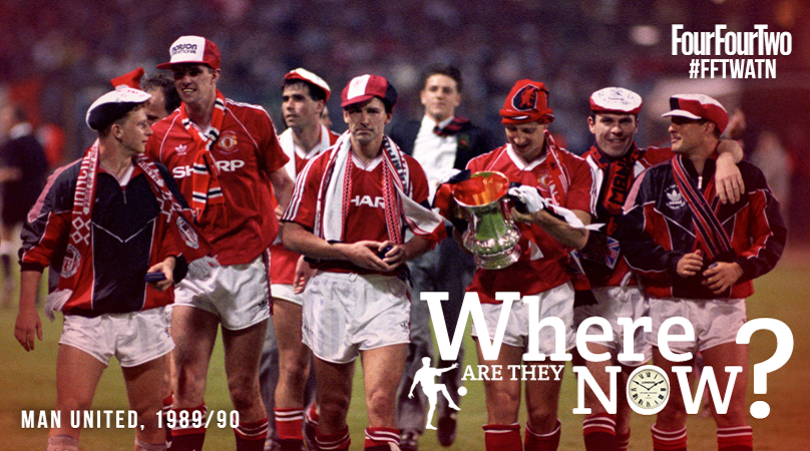The 10 best Manchester United players of the Premier League era
Seb Stafford-Bloor identifies the 10 biggest contributors to the most successful period in the Red Devils' history
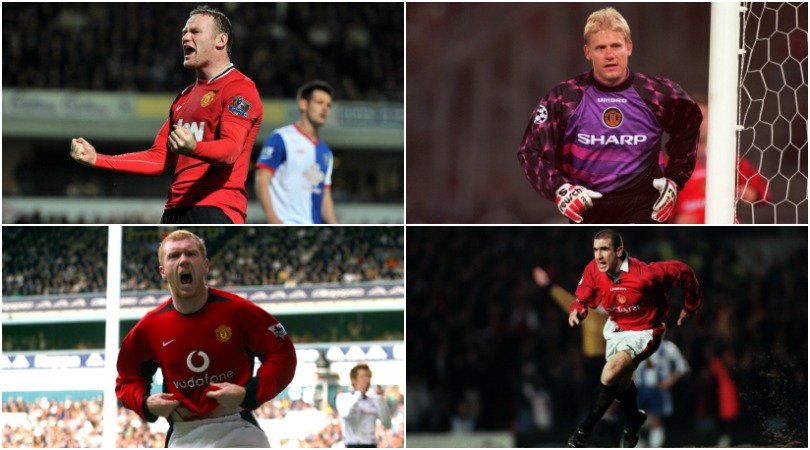
10. Rio Ferdinand
Ball-playing centre-halves are commonplace now, but he was comfortably the most cultured English defender of his generation
In 2001/02, the season before Ferdinand joined from Leeds United, Manchester United fielded a central defence featuring, at any given time, Laurent Blanc, John O'Shea, Wes Brown, Ronny Johnsen, Mikael Silvestre and a converted Gary Neville. They finished third and conceded more goals than five other teams, including Fulham. A year later, even with Ferdinand starting just 28 games, they won the division while conceding fewer goals than any other side.
The improvement relied on myriad factors, clearly, but it emphasised just how important Ferdinand was - and how essential he would continue to be. Ball-playing centre-halves are commonplace now, but he was comfortably the most cultured English defender of his generation and probably the first to break the traditional mould. Crucially, though, that wasn't to the detriment of his actual defending.
![Rio Ferdinandâ–¼Best Defender of his Generationâ–²2003 - 2014 Manchester United [HD] - YouTube](https://img.youtube.com/vi/ZkWSpaQZ3Y8/maxresdefault.jpg)
It's true: he very rarely left his feet. Ferdinand had anticipatory qualities which probably can't be taught and even in an habitually manic league he appeared startlingly untroubled. Fierce leadership styles can radiate through a side, but that kind of calm can also be infectious. Paul Hayward, now The Telegraph's chief sportswriter, once described him as an "elegant quasi-sweeper, gliding alongside a striker and stealing the ball off his toes". Perfect. That's exactly what he was - smart, stylish, and arguably the best defender in Europe during his prime.
9. Denis Irwin
That his security never depended on forcing opponents towards his stronger side betrayed a quite mastery of an unnatural position
Stability. For twelve seasons at Old Trafford, Irwin was virtually immovable at left-back. Arriving in 1990 and remaining at Manchester United until 2002, he was a foundation piece of Sir Alex Ferguson's success, but also an evergreen player who transcended eras, both at the club and in the game as a whole.
He's easy to overlook, operating as he did beneath a glinting surface layer, but his longevity is testament to how he reliable he was. The centre-backs inside him were chopped and changed, Gary Neville eventually made Paul Parker obsolete, but Irwin was a constant - an extremely stable full-back with some unlikely panache around a dead ball.
Get FourFourTwo Newsletter
The best features, fun and footballing quizzes, straight to your inbox every week.
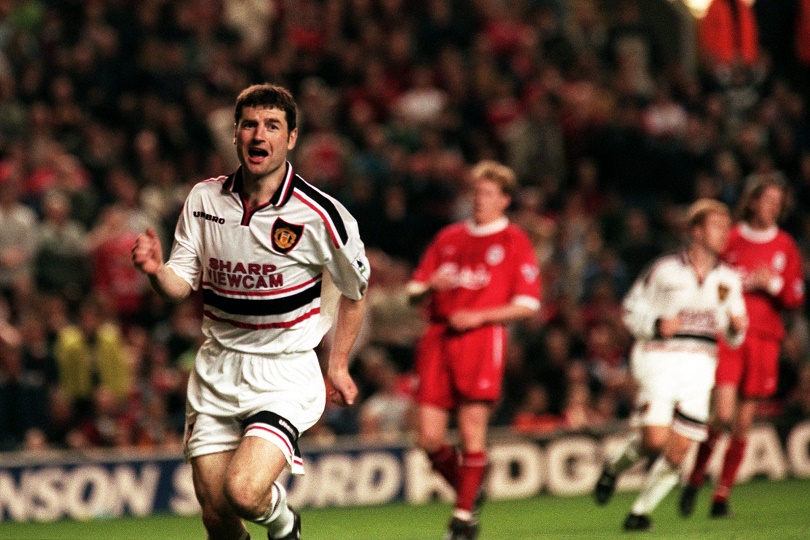
He was a rarity, too: a right-footer on the left-flank. That's unusual because it's difficult and it demands an even greater appreciation for the angles involved in the defensive third. Irwin existed at a time before inverted wingers became fashionable and when the trend was still for wingers to dart for the byline. That his security never depended on forcing opponents towards his stronger side betrayed a quite mastery of an unnatural position - as too, of course, are his 529 United appearances, making him the eighth most-selected player in the club's history.
8. Cristiano Ronaldo
United bought a batch of exciting yet unrefined attributes from Sporting Lisbon rather than a finished product
When a player enjoyed the kind of success that Ronaldo did, it must seem contrary to focus on what he symoblised instead of what he achieved. He won three Premier Leagues, an FA Cup, a League Cup and a Champions League at Manchester United, while his individual 2007/08 season was extraordinary. Unquestionably, he belongs on this list because of what he helped the club to do.
With hindsight, it's easy to assume that Ronaldo was always headed for the game's stratosphere. He wasn't - and therein lies the charm of his United career. He wasn't a homegrown player, but United bought a batch of exciting yet unrefined attributes from Sporting Lisbon rather than a finished product and, as such, he was the last great player built by Alex Ferguson and his coaching staff.
From 2003 onwards, each season would see a layer of the Portuguese's self-indulgence melt away; his tricks would be rationed, his choices became steadily better. Ronaldo is - and has always been - a remarkably driven personality, but in the wrong surroundings his career might have been very different. His ability gave him the opportunity to be nothing more than Nani, but it was United, Ferguson and Ronaldo himself that enabled that created the force of nature he is today.
That's important. Organic success may be a dying principle now and the amount of money in English football may have deprioritised talent production, but United have always had that association. Ronaldo is a generational talent, but picture him in that red shirt and you're reminded of the refinement process which led to him becoming one of most dominant forwards in Premier League history.
7. Gary Neville
For sportsmen or women who want to be champions, the mind can be as important, if not more important, than any other part of the body
The curse of a media career is that it normalises ex-players and, often, exposes the jovial side of their personalities. In Neville's case, that's particularly regrettable. Consider all of his handicaps - not that quick, not that physically tough, not particularly skilful - and then imagine what it was that allowed him to become, arguably, the finest English right-back in history. It must have taken iron-clad conviction and the relentless, humourless pursuit of something which seemed impossible.
"For sportsmen or women who want to be champions, the mind can be as important, if not more important, than any other part of the body."
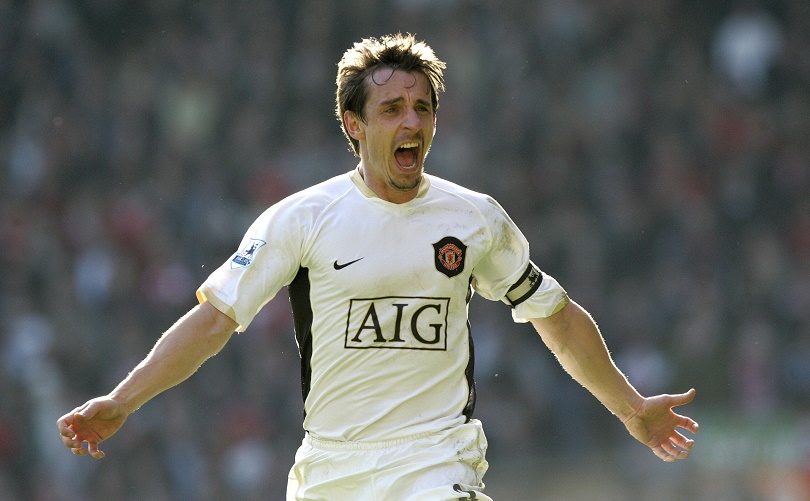
How apt. Doesn’t that describe him so well? Neville made over 600 appearances for Manchester United and yet, if pressed, most people could recall perhaps just ten individual moments from those 19 years. However, on the basis that full-backs are rarely remembered for anything other than their mistakes, that's really quite an accolade - and an illustration of how unwavering his concentration and awareness generally were.
At the beginning of his career, English football still operated around the parameters of speed and power and, given that Neville had neither of those qualities, he did incredibly well to even emerge from United's academy. Years later, Teddy Sheringham would become his teammate at Old Trafford and for most of his career the Tottenham forward had been held up as the counter-point to the imperative of athleticism - the first three yards are in the head, they used to say.
In actual fact, Neville is probably a better example: he not only had a more successful career, but he was also at the natural disadvantage of being a defender and having to react to - rather than influence - his surroundings. If Sheringham had a three yard head-start, Neville's had to be at least five.
But he embodied character, too. In 2004, United would beat Millwall in the FA Cup final. Post-game, Neville was interviewed on the pitch and, instead of tossing around the normal platitudes, he effusively and deliberately praised the performance of a young Cristiano Ronaldo. It was rare at the time, even more so now. Managers sometimes try to embolden developing players through the media, but teammates never do. How many others would have done that? How many would have been sufficiently circumspect to use that opportunity for the greater good?
It's a tiny example but it was highly descriptive of Neville's personality and the affection he had for his club. United have had many more talented players in their history - even just in the last 25 years - but rarely have they fielded someone to whom the overall cause mattered quite as much.
6. Wayne Rooney
He could dance around opponents' eyes and scratch their eyes, but could also punch them square in the face
Ignore the groans from the back of the room, he belongs - of course he does.
History will be kind to Rooney and, in a few decades, the memory of his late career elipsis will have faded. In its place will be a more vivid recollection of those earlier years and the seasons he emblazoned with that unnatural fearlessness. The videos don't lie: he really was that good.
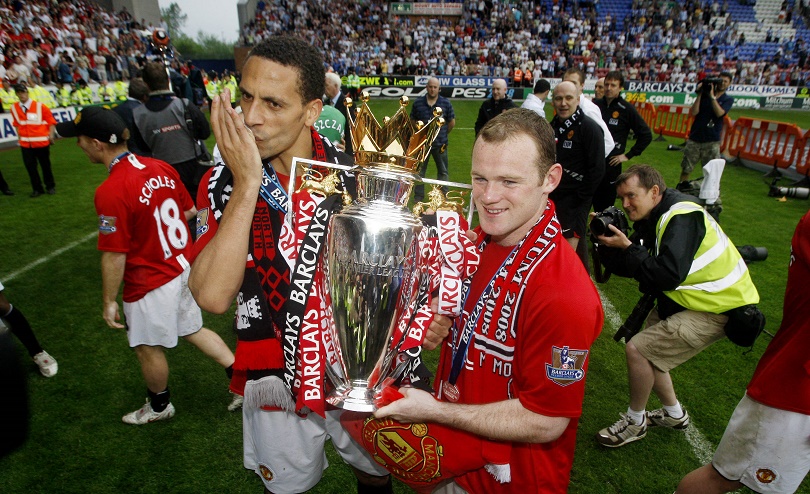
Moreover, he was touched by the same DNA that nearly every modern Manchester United great has been built from. He was better than other players and there wasn't so much as a slither of inhibition to his game. The more hostile a crowd was towards him, the better he tended to play; is there a more quintessentially United quality than that?
During that intoxicating peak, Rooney represented a new type of forward. He was a 21st century athlete in a traditional body, comprising intricacy and technique, but also blunt force; he could dance around opponents' eyes and scratch their eyes, but could also punch them square in the face.
His protracted decline has been illustrative of the attritional impact of top-flight football and his once explosive power has dulled almost entirely. But even now, three years into that slow death, it remains impossible to ignore his value to Sir Alex Ferguson's third great side, his role in Cristiano Ronaldo's own ascension and his place in the club's history.
5. Peter Schmeichel
The goalkeeper was one of the rocks upon which the Premier League's only true dynasty was built
Schmeichel was always more than his plunging save at Newcastle, his stunning denial in Vienna, or the many times he narrowed angles or smothered chances. His greatness was both blindingly obvious and extremely subtle.
In his autobiography, David Beckham told a story which vividly drew that elusive quality. Beckham recalled crossing practices in which Schmeichel would continuously goad Gary Neville, taunting him over every wayward delivery until the full-back was able to produce a perfect ball. Married with what the watching public regularly saw - the shouting at defenders, the terrifying command of his penalty-box - it shows that, while an outstanding goalkeeper in the literal sense, Schmeichel's influence flowed well beyond his position.
Five league titles and a European Cup provided a clear demonstration of his value, but consider also the conditions under which many of those trophies were won. United were a young side full of talented but impressionable players. Following the break-up of the Pallister-Bruce union in central-defence, they might also have been mired in flux had it not been for the continuity he provided. Henning Berg had a respectable Manchester United career, Ronnie Johnsen and David May did too, and Schmeichel is a big reason why.
The Great Dane was an organiser who created fear and accountability. He was also a marvellous shot-stopper with a range of distribution that was before its time. More importantly, though, he was a confluence of nearly every goalkeeping ideal, both physical and emotional, and one of the rocks upon which the Premier League's only true dynasty was built.
4. Paul Scholes
His goal-scoring alone makes a compelling case for his greatness, so too his medal collection, but one has to search to find his true value
Periodically, Scholes' worth is debated against other midfielders of his generation. When that happens, it's worth recalling Gary Neville's remarks from a distant episode of Monday Night Football: "All I will say is that Paul Scholes is the best player I've ever played with."
Not the best midfielder, the best player. Think of who that list includes: Eric Cantona, Paul Gascoigne, Cristiano Ronaldo, Wayne Rooney, Ryan Giggs. All five of those names belong among the very best in English football history and Neville, with no hesitation, places Scholes above them all.
His goal-scoring alone makes a compelling case for his greatness, so too his medal collection, but one has to search to find his true value. It's hidden in the autobiographies of former teammates and in stories told about Manchester United and England training sessions.
It can also, of course, be glimpsed in the reverence of his peers. Zinedine Zidane called him the "best player of his generation"; Ronaldinho aspired to "pass like him"; Dennis Bergkamp referred to him as "the master". For more contemporary references, hear the glowing tributes paid by Xavi Hernandez, Andres Iniesta and Leo Messi. Scholes, for all intents and purposes, was part of the curriculum at La Masia.
Perhaps the case is best made by Sir Bobby Charlton, who said that he "epitomises the spirit of Manchester United and everything that is good about football". It's highly descriptive and entirely accurate. Scholes wasn't flash and he didn't have a big bag of tricks. He was, though, the product of one of the most developed sporting brains the game has ever seen.
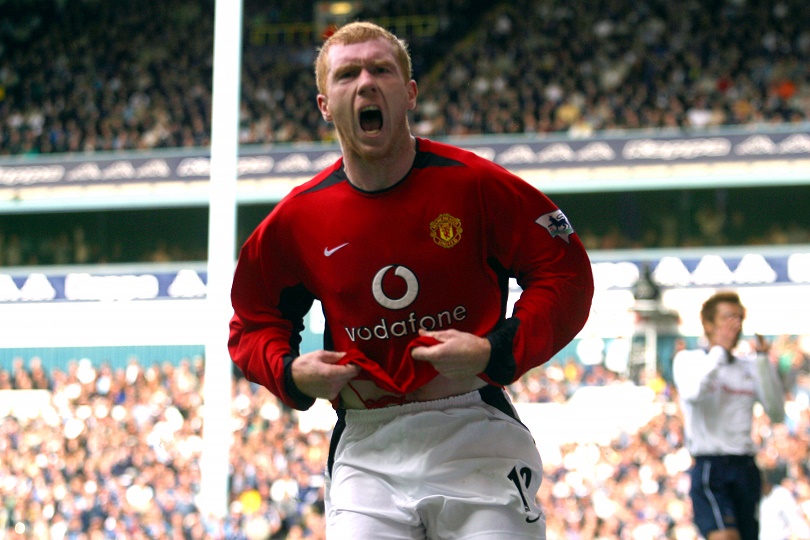
3. Roy Keane
It became legitimate to wonder whether, instead of satiating their own personal ambition, certain Manchester United players were driven through fear of Keane's wrath
The black heart of the midfield.
Keane came to a bitter end at Manchester United, but not before entering special territory. Around the turn of the millennium it became typical for him to be referred to as Ferguson's on-pitch self and to depict him as half-player, half-henchman.
It wasn't unreasonable: he played with a barely contained fury which stiffened even his teammates spines and, improbably, that menace still exists in television studios today. Keane was special. He was driven by a powerful darkness he sometimes failed to control, but it was an energy which allowed him to become more than he otherwise might have been. Eventually, it became legitimate to wonder whether, instead of satiating their own personal ambition, certain Manchester United players were driven through fear of Keane's wrath.
Given how broad his psychological influence was, it's extremely difficult to isolate his individual footballing qualities. He was a better passer than most remember and he often contributed significantly to United's attacking phases, but was he a truly rounded midfielder or were the emotional ripples he created just strong enough to give that impression?
Ultimately, it doesn't really matter. It's a worthy debate, but not one that really impacts upon his legacy. Keane's career can't be reduced to anecdotes, it can only be judged as an entire body of work. Assessing him on the basis of what he brought rather than what he allowed others to do is to miss the point; would Paul Scholes have shone as brightly without him? Would United have been able to emerge from that 1999 semi-final in Turin without not just his goal, but his steady-pulsed resilience?
He wasn't Eric Cantona. He wasn't made from that kind of fabric. He did, however, create a level of accountability within his side that no other British-based midfielder has been able to replicate since.
2. Ryan Giggs
Although he's indelibly associated with all of Manchester United’s material success, Giggs will always be about the aesthetic
The obvious point first: nobody will ever even threaten his 963 appearances or replicate his longevity. Giggs had the rare ability to tailor his game to both the changing times and, eventually, his diminishing physical abilities. From around 2005 onwards, his relevance depended on near constant reinvention. For that final decade, he wasn't just an ageing player raging against the dying of the light, but an asset to a club competing right at the top of the game. In time, the world will realise just how remarkable a feat that was.

Although he's indelibly associated with all of Manchester United’s material success, Giggs will always be about the aesthetic. The way he used to run with the ball had a poetic quality, with his upright stance, his perfect balance and smooth motion. The concept of "The United Way" may have faded with time, but he was synonymous with that kind of football: ambition with the ball; the intention to attack; playing in a way that excited the crowd. Like Jerry West and the NBA logo, Giggs' silhouette remains the emblem of an unique brand of exhilarating excellence.
Long before Thierry Henry and Cristiano Ronaldo entered the league and created a new standard for dynamic attacking, he was the player who frightened rival supporters every time he touched the ball.
1. Eric Cantona
When the Class of '92 talk about Cantona, it's often in terms they would usually reserve for their fathers. Even now, many years after their own careers have come to an end, there's a reverence to their tone when they discuss the Frenchman. Most of them became seasoned internationals, veterans of World Cups and European champions, but still they remain in awe.
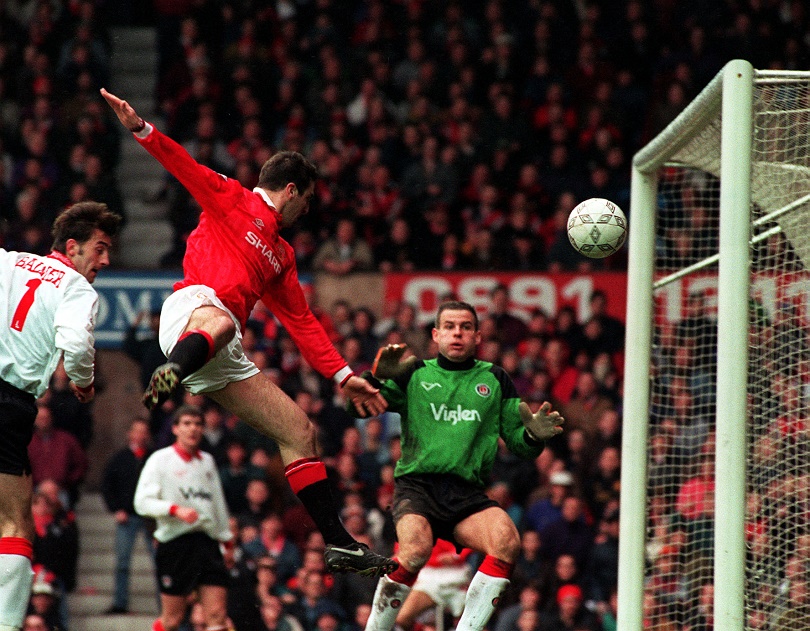
If, then, it's accepted that those players collectively represented the biggest organic talent infusion of the Premier League era, and that they were each individually emboldened by playing alongside Cantona, it makes an overwhelming case for him being the most important player of all. He was Old Trafford for just five years, but that it seemed like so much longer really confirms the point: he was modern Manchester United before such a concept existed.
Cantona was goals, presence and fearless swagger, but he also represented identity. Outside of Manchester, United were envied for their excellence and loathed for the arrogance which it was perceived to breed. And who, of all the players involved in their decadent success, represents those qualities more than anyone else? It's tenuous, but one could still easily make the argument that 1990s United adopted Cantona's personality rather than vice versa.
When you thought of them, you pictured him - and, tellingly, you still do.
Seb Stafford-Bloor is a football writer at Tifo Football and member of the Football Writers' Association. He was formerly a regularly columnist for the FourFourTwo website, covering all aspects of the game, including tactical analysis, reaction pieces, longer-term trends and critiquing the increasingly shady business of football's financial side and authorities' decision-making.
